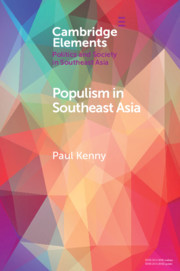Description
Populism in Southeast Asia
Elements in Politics and Society in Southeast Asia Series
Author: Kenny Paul D.
Language: English
Subject for Populism in Southeast Asia:
Approximative price 22.46 €
In Print (Delivery period: 14 days).
Add to cart
Publication date: 11-2018
Support: Print on demand
Support: Print on demand
Description
/li>Contents
/li>
Conceiving of populism as the charismatic mobilization of a mass movement in pursuit of political power, this Element theorizes that populists thrive where ties between voters and either bureaucratic or clientelistic parties do not exist or have decayed. This is because populists' ability to mobilize electoral support directly is made much more likely by voters not being deeply embedded in existing party networks. This model is used to explain the prevalence of populism across the major states in post-authoritarian Southeast Asia: the Philippines, Indonesia, and Thailand. It extracts lessons from these Southeast Asian cases for the study of populism.
1. Introduction; 2. Defining populism; 3. The causes of populism in Southeast Asia; 4. Fragmented parties; 5. Populist leaders; 6. Conclusion – populism and democracy.
© 2024 LAVOISIER S.A.S.




